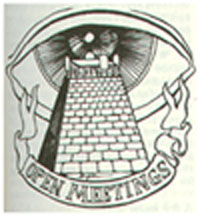
deliberations and the actions, final or not, of all units of government (with the few exceptions noted) must be conducted and taken at open public meeting. Most important of all," he says, "although deliberations upon the excepted subjects may be held in a closed session, final action upon all matters must be taken in an open meeting."
As Morrison told the forest commissioners, the General Assembly had "some reason" for making exceptions to the open meetings act. But it is difficult to determine, he said, because no records were kept of debate. "Judicial determination," he said, is "the only alternative."
So Morrison looked to the Collinsville decision. And Scariano looked to

an appellate court case in 1975 out of DuPage County in which it was decreed that the intention of the General Assembly in enacting the open meetings act was to favor open deliberation as well as open action.
Atty. Gen. William J. Scott said that exceptions to the law are few. He quoted a 1974 appellate court decision in a case involving news broadcasters and the City of Springfield, where the court said that exceptions "must be narrowly construed because they derogate the general policy of open meetings." At the same time, the state's top elected legal officer noted that "there is no provision in the Act which specifically voids action taken at an improperly closed meeting and no Illinois court has ever so held."
Despite all the controversy, Scariano believes that the open meetings act is "working very well." He cited two basic reasons: (1) The American tradition of "general compliance ... a lot of people say they may not agree with a law, but they'll follow it;" (2) The news media has been "extremely vigilant. . . suits have been filed." What makes the Illinois law the best in the land, Scariano said, is that it is the only one which requires that the press be notified of meetings of public bodies at the same time and in the same way as the members of the bodies are notified. "That's unique," he said, "and puts teeth in the law."
The Illinois law has gained a certain amount of notoriety. Matijevich, whose committee held the two public hearings, says he is getting requests for transcripts from law schools and other state legislatures. Writing in the Northwestern University Law Review, Douglas Q. Wickham put it plainly: *"0ur society firmly believes, on the one hand, that the right to participate in our democracy includes the right to be informed. The people have no real power without factual knowledge of what their government is doing to and for them." To be well informed, Wickham writes, "the public should have some access to the ongoing process of decision-making; not only to what is done, but also to why it is done and what alternatives are considered and rejected. A truly democratic electorate vitally needs to know this information." However, he says, alluding to the title of a decade-old Florida law, "we must concede that there are limits to 'Government in the Sunshine.'" In the early stages of working out a specific problem, Wickham says, "it makes a good deal of sense for any governmental body to retain a zone of privacy within which its members can air internal disagreements." One of Wickham's major points: "The value competing against a 'right to know' then is not a 'right to secrecy,' but an assurance of some insulation from the intense heat of public pressure . . . absolute openness will detract from the overall public interest in informed and rational governmental decisions."
People's right to know
Morrison puts it this way: "The
people's right to know is like all other
such rights — there is a certain degree of
limitation." Open doors or closed doors; that is the question. And if they're
closed, when and how often and for
what reason?
•Douglas Q. Wickham, "Let the Sun Shine In!" Northwestern University Law Review 68 (July-August 1973): 480-501.
Selected State
Reports
State documents
• "Providing Civil and Criminal Legal
Services to Inmates Incarcerated in Correctional Institutions in Illinois: An Evaluation
of Projects Funded by the Illinois Law
Enforcement Commission," by Mott-McDonald Associates, Inc. (December 1975),
165pp.
"There is growing availability of inmate
legal services, but their supply is still
inadequate to the legitimate demand for
them." Evaluates three projects to provide
such services: Prison Legal Services Project
(PLSP), Institutional Legal Services Project
(ILSP), and Civil Legal Aid and Social
Service Project (CLASS).
• "Report," Subcommittee on Charitable
Institutions, Legislative Commission to
Visit and Examine State Institutions (April
1976), 45 pp.
Descriptions of and recommendations on
eight mental health facilities, developmental
centers, and nursing homes.
• "Overlap or Duplication of Activities
between the Department of Finance, the
Office of the Comptroller [and] the Office of
the Auditor General," Illinois Office of the
Auditor General (February 1976), 57pp.
Lists areas of (1) duplications between
the Department of Finance and the Office of
the Auditor General; (2) no duplication or
overlap between the Department of Finance
and the Office of the Auditor General; (3)
possible violation of state law by Department of Finance reorganization which
created the Bureau of Audits and ultimately
severed it from the Division of Accounting.
Other reports
• "Rulemaking under the Illinois Pollution Law," by David P. Currie in University
of Chicago Law Review, vol. 42 (1975) :457- 508.
The author is former director of the
Illinois Pollution Control Board (PCB). He
assesses the first five years of the Illinois
Environmental Protection Act, and notes
that under the act the PCB is given broad
rulemaking power to set substantive standards to regulate air pollution, water
pollution, solid waste disposal, public water
supplies, and noise.
Items listed under State Documents have
been received by the Documents Unit,
Illinois State Library, Springfield, and are
usually available from public libraries in the
state through interlibrary loan. Requests for
copies should be sent to the issuing agency.
/S.C.ˇ
February 1977 / Illinois Issues / 5